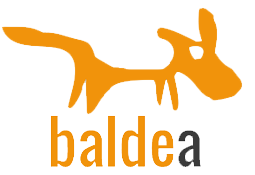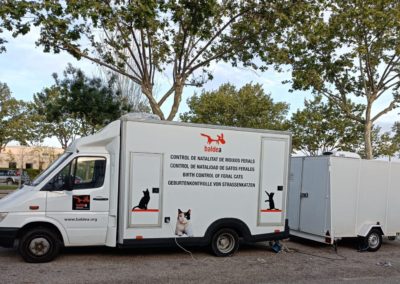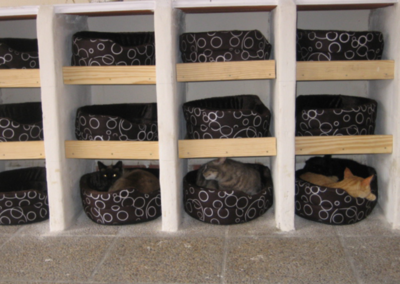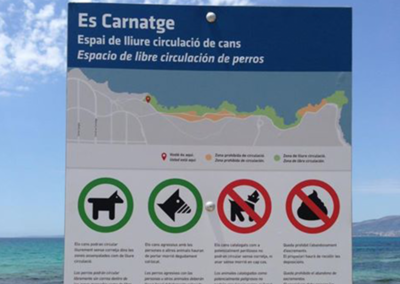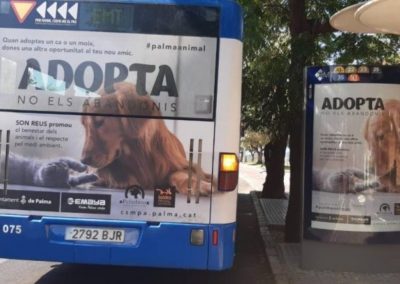Projects
Our base
Baldea is the Federation of Balearic Animal Welfare Organisations that brings together different associations to save the lives of thousands of animals and fight for them to be treated with dignity and respect.
For this reason, we have different projects that take effect at different points in life, address different target groups and, above all, should benefit the animals.
A few facts & framework data
about BALDEA
Baldea does NOT rescue or place animals itself, our affiliated clubs do this, concrete figures are not available. But you can say about 300 animals per year per club, with 7 clubs this is more or less about 2000 animals.
On average, around 1,500 street cats are neutered by BALDEA every year in our Baldea sterilization mobile or in veterinary clinics.
In 2008, BALDEA received the “PREMIO JAUME II” award from the Balearic government and in 2022, 2 board members received another award from the MALLORCA ZEITUNG for their work.
For security reasons, we do not publish the names of our members and sponsors on our website.
Frequently Asked Questions
What do you do if you witness animal abuse?
- If you observe a case of disproportionate aggression towards an animal, immediately notify the police (112) or the Guardia Civil (telephone: 062).
- Summon other people if you are afraid to face the situation alone.
- If possible, take photos and try to get as much information as possible (location of the event, name and address of the perpetrator, date and exact time) and report the aggressor. Please enter your contact details (name, telephone number, e-mail etc. so that we can stay in contact with you and clarify any questions that may arise)
The Criminal Code, Article 337, states that if a pet is punished unjustly, it is a misdemeanor. The Guardia Civil, Policía Nacional, etc. must intervene due to an existing crime.
What do you do when animals are poorly kept?
-
If you think an animal is being kept in poor conditions, then follow a series of steps
1) The first thing to do is to determine whether you are in breach of a municipal ordinance. And above all, whether the “animal protection law of the Balearic Islands” is observed. “Ley Balear de Protection de los animalsque viven en el entorno humano 1/92 de 8 de April (y Reglamento que la desarrolla 56/1994)”. See law Ley 1/92.
Unfortunately, keeping dogs in chains is not prohibited. A dog may be chained for a maximum of 23 hours a day. Once a day he has to come off the chain. Exactly what that should look like, size of the area, etc. is not described. It is impossible to control whether the owner actually releases the dog on a daily basis. They usually have all sorts of excuses. BALDEA has been fighting for years to revise the law here, unfortunately without success so far.
By law, the dog/horse must have a hut/shelter available, as well as sufficient water and food. if this is obviously not the case, the police must be involved.
2) Also notify the responsible community institutions (town hall). The Policía Local, the municipal police, is usually responsible for the inspections, they also have to punish the offenders. It is advisable to do everything in writing.
It is always beneficial to show photos of the animal and details of the owner and circumstances to help identify the culprit
3) Due to a lack of staff or volunteers, animal protection organisations often do not have the opportunity to intervene when an animal is harmed.
Since 2007, BALDEA has followed up around 70 cases annually on a voluntary basis. Unfortunately, we are only able to do inspections once a week, since daily work such as castration campaigns, school projects, fundraising, etc. takes up all of our time.
In general, neither we nor other animal welfare organisations can take action if neighbours feel bothered by barking dogs etc.
What do you do when you find an abandoned or runaway dog?
First, go to the local police or a veterinarian to see if the dog has a chip (usually subcutaneous on the left shoulder). If this is the case, the owner can thus be determined. If he cannot be identified and you are not already with the police, call them. She will have the dog picked up and taken to the nearest municipal animal shelter. He was placed there within 15-21 days, his time is up and no animal rights activist or club can take him in, most community animal shelters try to keep him for a while. But if too many dogs arrive at the same time, he will be put down.
Does Baldea take in animals?
No, BALDEA does not have an animal shelter itself. We represent many animal protection organisations on the island and try to take over the work that the animal protection associations that deal with the adoption of animals cannot do due to lack of time and permanent overload.
What is the difference between a Refugio and a Perrera in Mallorca?
The perreras municipales (municipal animal shelters) keep the animals captured or given away for between 15 and 21 days. If they are not adopted in the period and there is not enough space, they will be put down. Countless animal protection associations and private animal lovers make a significant contribution to the fact that the number of animals put to sleep in the municipal animal shelters is not too high, depending on the season, but unfortunately there are still killings depending on the animal shelter. The community animal shelters have to pay for what inconsiderate keepers cause.
Some private animal welfare associations, such as the SOS ANIMAL MALLORCA association in Calviá, where none are euthanized, adopt animals from the municipal animal shelter. Likewise communities such as Felanitx and Capdepera.
Most municipalities have an agreement with Natura Parc, a private company that collects abandoned or found dogs, cats, horses and places them in their own shelter. Here, as in a municipal animal shelter, people are put to sleep after the deadline has expired, but many volunteers and animal welfare organizations try to save as many animals as possible by distributing them to foster homes.
The Son Reus municipal animal shelter is responsible for Palma, where animal rights activists also save a large proportion of the animals from death.
Refugios, on the other hand, are private, not-for-profit animal shelters that take in animals or take them from municipal shelters. Unfortunately, all refugios are struggling to survive and are largely dependent on donations and volunteers. The refugios give away dogs and cats with chip, vaccinated and often already neutered for an amount between 150-350 €, which often just covers the costs, since this is a mixed calculation. There are animals that stay in shelters for a very long time, sick animals that can be expensive to treat or even require costly surgeries.
What do you have to consider when adopting a pet?
Adopting an animal is a commitment for the animal’s entire life.
It must be taken into account that rabbits can live an average of 10 years, dogs 15 years, cats up to 20 years, horses 30 years and parrots and turtles – even depending on the species – up to 100 years.
The animal should fit into the everyday life of humans, sufficient financial means should be available in case of illness, and above all enough time and patience should be given to educate or keep the animal busy. With a dog that has a property available, a varied walk should be taken every day to satisfy its need for smells and to train its muscles.
It is important that you know the needs of the animal exactly. The different dog breeds have their specific needs: herding, driving, hunting, etc., in order to satisfy this disposition accordingly or to keep it under control through training.
Can I keep a dog/cat?
You should answer these questions with YES:
Will the whole family agree?
Do I have enough space for the animal?
Do I have the time and patience to educate?
Will I be able to accompany the animal until it dies?
Will I collect the dog’s droppings on the street?
Can I cover the veterinary costs?
Can I make sure it doesn’t reproduce unintentionally?
Can I pay the sterilisation costs? Up to € 300 for large dogs?
Who will take care of the animal in my absence during vacation or illness?
Who takes care of the animal if you have to move?
Which is better: a pedigree dog or a mongrel/mixed breed?
The most important thing is that you deal with the breed-specific characteristics of the dog and thus protect yourself from surprises. Some breeds are over-bred and suffer from diseases or deformities that serve the supposed beauty but make the animal suffer. HD in German Shepherds, short noses in Pugs, wrinkles in Sharpeis etc.
Mixed breeds are usually less susceptible to diseases and more stable in character and more unique in their mix.
Is it better to adopt a puppy or an adult dog?
The advantages of adopting an adult dog cannot be denied. They are usually housebroken unless they have just been kept outside, but generally dogs are good learners well into old age. Adult dogs don’t chew everything, usually don’t nibble on furniture, shoes, etc. They are fully grown and often quite well socialised and may have already learned something. The private animal protection associations and homes give them away with a chip, vaccinated and often already neutered for an amount between €150-350, which often just covers the costs.
But you should be aware that every dog has its own character and some are rather calm by nature, others are very active, others are quite independent, others are very affectionate, maybe also rather reserved, there are dogs that children love, others are more afraid of children as they can be noisy and lively…..
The care of the fur can also be decisive when choosing a dog / cat.
Where can you adopt animals?
More than 10,000 animals, mainly dogs, are abandoned in Mallorca every year. Look on our page under members and go to the links of the many animal shelters. Here you will find countless animals that urgently need a new loving home.
What do you do when you have to part with your pet?
Due to the fact that the private animal shelters are bursting at the seams, this should be the very last option.
- Ask all acquaintances, friends, family members, work colleagues etc…
- Use social networks like Facebook, post good photos with an accurate description of the animal.
Are there entry requirements for dogs in the EU?
We were kindly provided with this link for information on entry regulations for dogs within the EU. Here you will find everything you need to know (sorry only available in german):
